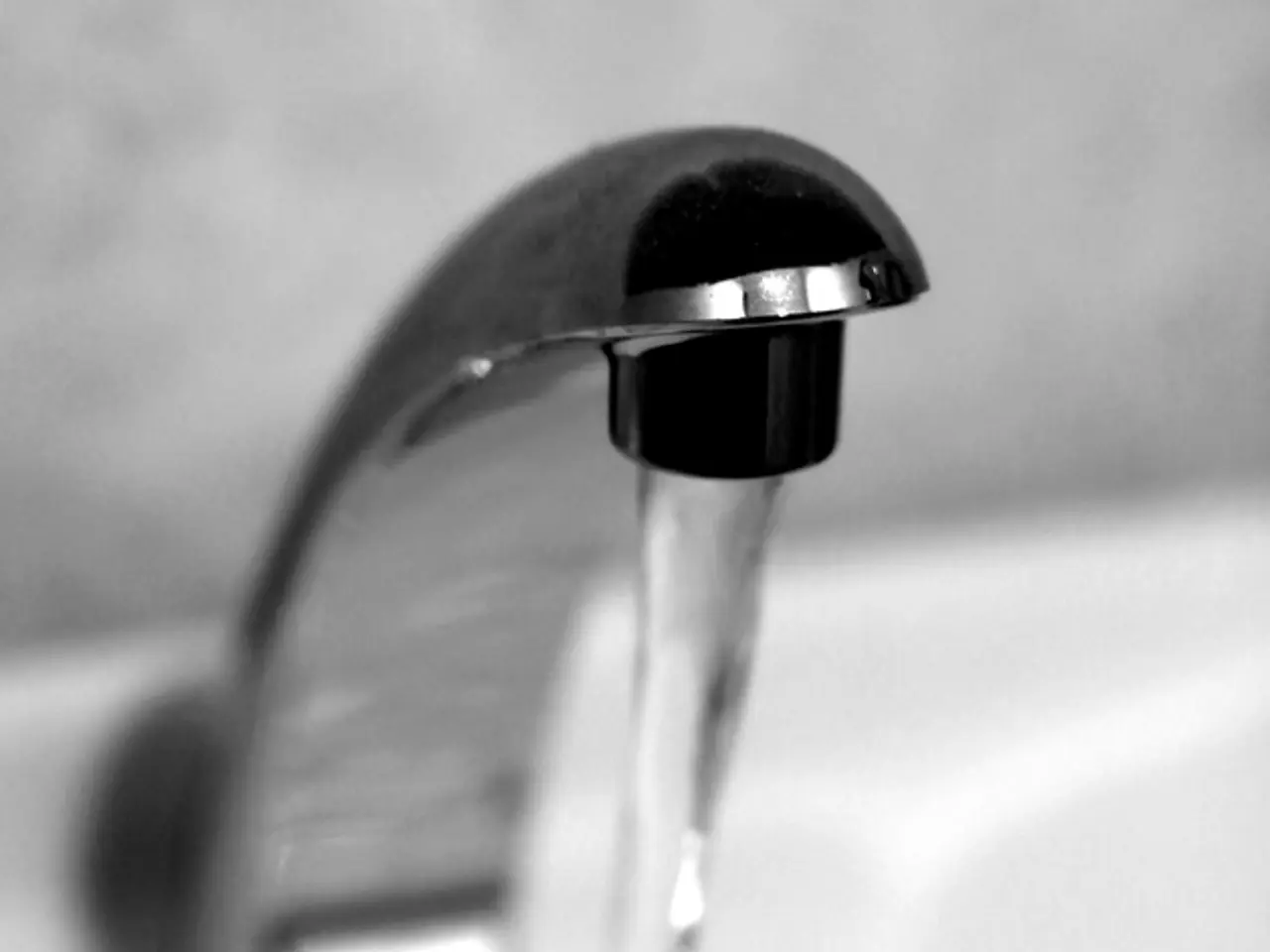Cutting down on tap water contaminants could potentially prevent over 100,000 cancer cases, according to EWG.
The Environmental Working Group (EWG) has issued new recommendations to address the issue of multiple tap water contaminants linked to cancer risks in the United States. The organisation advocates for stronger regulation, updated safety limits, and increased transparency to ensure the safety of drinking water[1].
Key EWG recommendations include:
- Updating federal legal limits for contaminants, since many have not been revised in decades despite new scientific findings linking them to cancer and other diseases[1].
- Expanded monitoring and reporting through comprehensive tap water databases to inform consumers about contaminant levels in their local water supplies, helping them make safer choices[2][5].
- Restricting pollution at the source rather than relying solely on removing contaminants after water treatment, with a focus on upstream prevention of chemicals like PFAS entering water supplies[3].
- Advocating for more aggressive federal action and precautionary standards particularly around persistent and bioaccumulative substances such as PFAS, which currently lack enforceable strict limits despite their cancer risks[1][3].
- Supporting the development and dissemination of advanced, cost-effective water treatment technologies to help small and vulnerable water systems remove contaminants efficiently[4].
Collectively, these recommendations aim to reduce cancer cases by lowering exposure to a broad spectrum of tap water contaminants through better regulations, consumer awareness, pollution prevention, and improved treatment infrastructure[1][3][4].
The study focuses on carcinogenic contaminants such as arsenic, disinfection byproducts, and radioactive substances[6]. The new risk assessment model used by EWG analyzes the cumulative impact of 19 different carcinogenic contaminants[7]. EWG estimates that over 100,000 U.S. cancer cases could be linked to drinking water contaminants[8].
The EWG is calling for an overhaul of the EPA's outdated drinking water regulations, many of which haven't been updated in decades[9]. The organisation believes that current EPA standards fall short of protecting public health[10]. Olga Naidenko, Ph.D., vice president for science investigations at EWG, stated that efforts should go beyond single-contaminant strategies[11]. Instead, the focus should be on a wider array of contaminants, not just single substances[12].
In addition to these recommendations, EWG's proposals also include improving pollution prevention efforts at the source[13]. Americans using community water systems are exposed daily to mixtures of potentially harmful substances[14]. The top ten contaminants, if reduced across the board, could prevent more than half of the projected cancer cases, according to EWG's analysis[15].
In summary, the EWG calls for robust regulatory updates, preventive pollution control, public access to data, and enhanced treatment solutions to address the complex mixture of harmful contaminants in U.S. tap water that pose cancer risks. The organisation's recommendations emphasise the need for updated water regulations to better protect public health.
[1] Environmental Working Group. (n.d.). EWG's Tap Water Database. Retrieved from https://www.ewg.org/tap-water/
[2] Environmental Working Group. (2021, March 10). New EWG report shows dramatic public health gains possible by targeting multiple pollutants, not just single substances. Retrieved from https://www.ewg.org/research/new-ewg-report-shows-dramatic-public-health-gains-possible-targeting-multiple-pollutants-not
[3] Environmental Working Group. (2021, February 23). EWG calls for an overhaul of EPA's outdated drinking water regulations. Retrieved from https://www.ewg.org/release/ewg-calls-overhaul-epas-outdated-drinking-water-regulations
[4] Environmental Working Group. (2021, February 24). EWG applauds Biden administration's commitment to modernising water infrastructure. Retrieved from https://www.ewg.org/release/ewg-applauds-biden-administrations-commitment-modernizing-water-infrastructure
[5] Environmental Working Group. (2021, March 10). New EWG report shows dramatic public health gains possible by targeting multiple pollutants, not just single substances. Retrieved from https://www.ewg.org/research/new-ewg-report-shows-dramatic-public-health-gains-possible-targeting-multiple-pollutants-not
[6] Environmental Working Group. (2021, March 10). New EWG report shows dramatic public health gains possible by targeting multiple pollutants, not just single substances. Retrieved from https://www.ewg.org/research/new-ewg-report-shows-dramatic-public-health-gains-possible-targeting-multiple-pollutants-not
[7] Environmental Working Group. (2021, March 10). New EWG report shows dramatic public health gains possible by targeting multiple pollutants, not just single substances. Retrieved from https://www.ewg.org/research/new-ewg-report-shows-dramatic-public-health-gains-possible-targeting-multiple-pollutants-not
[8] Environmental Working Group. (2021, March 10). New EWG report shows dramatic public health gains possible by targeting multiple pollutants, not just single substances. Retrieved from https://www.ewg.org/research/new-ewg-report-shows-dramatic-public-health-gains-possible-targeting-multiple-pollutants-not
[9] Environmental Working Group. (2021, February 23). EWG calls for an overhaul of EPA's outdated drinking water regulations. Retrieved from https://www.ewg.org/release/ewg-calls-overhaul-epas-outdated-drinking-water-regulations
[10] Environmental Working Group. (2021, February 23). EWG calls for an overhaul of EPA's outdated drinking water regulations. Retrieved from https://www.ewg.org/release/ewg-calls-overhaul-epas-outdated-drinking-water-regulations
[11] Environmental Working Group. (2021, March 10). New EWG report shows dramatic public health gains possible by targeting multiple pollutants, not just single substances. Retrieved from https://www.ewg.org/research/new-ewg-report-shows-dramatic-public-health-gains-possible-targeting-multiple-pollutants-not
[12] Environmental Working Group. (2021, March 10). New EWG report shows dramatic public health gains possible by targeting multiple pollutants, not just single substances. Retrieved from https://www.ewg.org/research/new-ewg-report-shows-dramatic-public-health-gains-possible-targeting-multiple-pollutants-not
[13] Environmental Working Group. (2021, February 23). EWG calls for an overhaul of EPA's outdated drinking water regulations. Retrieved from https://www.ewg.org/release/ewg-calls-overhaul-epas-outdated-drinking-water-regulations
[14] Environmental Working Group. (2021, March 10). New EWG report shows dramatic public health gains possible by targeting multiple pollutants, not just single substances. Retrieved from https://www.ewg.org/research/new-ewg-report-shows-dramatic-public-health-gains-possible-targeting-multiple-pollutants-not
[15] Environmental Working Group. (2021, March 10). New EWG report shows dramatic public health gains possible by targeting multiple pollutants, not just single substances. Retrieved from https://www.ewg.org/research/new-ewg-report-shows-dramatic-public-health-gains-possible-targeting-multiple-pollutants-not
Read also:
- Exploring the Strength of Minimally Digestible Diets: A Roadmap to Gastrointestinal Healing
- Secondhand Smoke: Understanding its Nature, Impact on Health, and Additional Facts
- Could a Secret Heart Rhythm Device Infection Be Causing Your Illness?
- Child Water-shift Ailment Identification and Treatment: Recognizing Symptoms and Steps to Take





